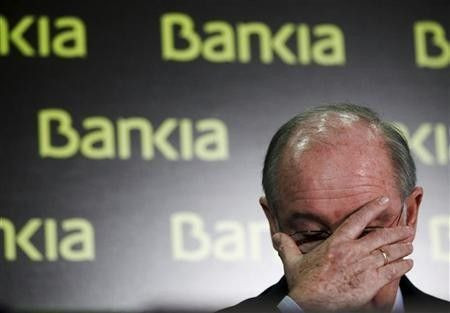Spain's Desperate Effort To Save Its No. 4 Bank - AIG All Over Again?
ANALYSIS

U.S. investors came back from a long holiday weekend Tuesday to news of Spain's government aiming to stave off an apparently imminent collapse of nationalized financier Bankia S.A. -- the country's fourth-largest bank -- with a €19 billon ($23.8 billion) capital injection.
After weeks of focusing on Athens, Wall Street's favorite guessing game Tuesday became figuring out how Madrid planned to come up with that amount of cash, while at the same time staring down near-daily street protests from a citizenry with over-24 percent unemployment, intractable sovereign deficits and a mutiny by international lenders that has driven borrowing costs to unsustainable levels.
The size and structure of the impending bailout brought comparisons to the ongoing situation in Greek finance, to the 2010 European Union rescue of the Anglo Irish Bank and -- of course -- to the 2008 U.S. recapitalization of American International Group, still the granddaddy of all corporate bailouts at over $180 billion. But the larger-than-life nature of the action and the protagonists behind it also brought a less kind -- and perhaps more accurate -- assessment: A prominent blogger at the London-based Financial Times christened Bankia as a gluttonous 'Cookie Monster,' set to hungrily devour the entire cookie jar while making muppets out of the international financial community.
The Bankia affair, it seems, has more characters in common with Sesame Street than with Wall Street.
The current debacle began earlier this month, when the Spanish government converted a previous loan of €4.5 billion into bank equity, effectively assuming state ownership of the institution. But it blew up this past weekend, as the financier's parent company announced it would be reissuing financial statements from 2011 to account for a loss of €3.32 billion. That hole is large enough to swallow the previously reported €40.9 million profit 80 times over. The bank's parent also admitted its asset portfolio, with €40.8 billion in defaulted mortgages, might be as worthless as Oscar the Grouch's trash can.
Playing the leading man role in the banking saga has been Spanish Prime Minister Mariano Rajoy, who has delivered a spot-on Kermit the Frog impression, looking confused and green at attempting to corral in the circus before him, while notably avoiding criticism of his co-stars' follies.
Rajoy now appears to be shuffling between various options for a bailout. On Monday, media sources reported the government was planning on conducting somewhat of a stealth recapitalization, making a multi-billion dollar sovereign bond issue and gifting the notes to Bankia's balance sheet, then borrowing from the European Central Bank using those obligaciones as collateral. The plan was poorly received by the European markets, and seemed to be shelved by Tuesday, as Reuters cited an unnamed government official in reporting Spain would pursue a more conventional open-market issue to raise the cash needed to save Bankia. The ECB would likely play a role in this plan as well, perhaps by buying up the newly issued debt if it began to fall under certain thresholds.
A third alternative also being floated involves drawing on the European Financial Stability Fund, the EU's all-purpose bailout vehicle, although such a move is politically explosive, as it would likely bring demands from outside lenders to implement further austerity measures on the recession-ravaged Spanish economy.
All the options are also somewhat speculative on Spain's part, as they assume the European Central Bank will be happy to once again act like the numbers-loving Count von Count, happily ticking off the billions flowing out of its bailout spigot without saying Enough! Tuesday afternoon, central bank spokesman Amadeu Altafaj said that even though the ECB had been in touch with Madrid, we still have not received any notifications regarding Bankia.
Rajoy, Bankia and the ECB are far from being the only players whose actions have been worthy of children's show characters.
International accountancy Deloitte, which should have had the Big Bird's eye view of the situation, shocked the Spanish Parliament Tuesday by noting that, while they were aware of irregularities in the firm's financial statements as early as last October, they decided it best not to tell anyone. Displaying the incredible naiveté that could only be believed of an 8-foot-2 puppet with the mind of a toddler, a representative of the company told the lawmakers Deloitte believes it had performed its fiduciary duty by not signing off on Bankia's latest audit in early May, even if it failed to inform the government of what was going on, as would have been expected.
Meanwhile, Aurelio Izquierdo, a former high-level executive at Bankia who was fired after the first bailout and became known in Spain as, essentially, the top sacrificial scalp claimed by the initial government intervention, is now being recast as a greedy, fickle Miss Piggy. News reports have noted that, even following the restatement of Bankia's results, he stands to collect a €13.8 million salary for 2011.
Perhaps worst off has been Miguel Angel Fernández Ordóñez, the governor of the Bank of Spain, who has appeared as a delusional Gonzo archetype, becoming a national punchline as newspapers print insider accounts of how his lack of financial markets knowledge and spinelessness in standing up to entrenched banking interests contributed to the current state of affairs. Mafo, as the central banker is known in Spanish media, said Tuesday evening he would be resigning before his term is up, giving up a chance to defend his actions in front of the country's legislature to focus on possibly having to defend them in front of a criminal inquiry.
All the while, the benchmark IBEX 35 Index of Spanish equities is at levels not seen since 2003, yields on benchmark 10-year notes are over 6.5 percent, and default insurance on the country's sovereign debt exceeds 500 basis points.
© Copyright IBTimes 2024. All rights reserved.





















